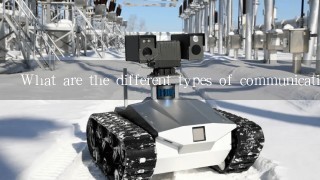What are the different types of communication protocols that robots use?

Answer:
Types of Communication Protocols for Robots:
1. Local Area Network (LAN) Protocols:
- Wi-Fi: Wireless technology used for communication within a limited range.
- Bluetooth: Short-range wireless technology for short-distance communication.
- Ethernet: Standard for wired communication over a network cable.
- USB: Used for high-speed data transfer between devices.
2. Cloud-Based Protocols:
- Internet of Things (IoT): Communication between devices and the cloud.
- Cloud Computing: Data storage and processing in the cloud.
- Cloud Messaging: Communication between robots and external systems.
3. Wireless Communication Protocols:
- Bluetooth Low Energy (BLE): Low-energy wireless technology for short-range communication.
- Zigbee and Z-Wave: Low-power wireless protocols for home automation and smart devices.
- Wi-Fi: Used for high-speed data transfer between robots and the cloud.
4. Physical Communication Protocols:
- Infrared: Infrared signals for long-range communication.
- Radio waves: Used for high-frequency communication over longer distances.
- Ultrasonic: Sound waves for short-range communication.
5. Human-Robot Interaction (HRI) Protocols:
- Natural Language Processing (NLP): Robots understand and respond to human language.
- Eye-Tracking: Robots track and follow human eye movements.
- Haptic Feedback: Robots provide tactile feedback to the human operator.
6. Blockchain Protocols:
- Cryptocurrency: Secure and transparent communication between robots.
- Smart Contracts: Automated agreements between robots and external entities.
Note: The choice of communication protocol depends on factors such as range, power consumption, security, and application requirements.



























































